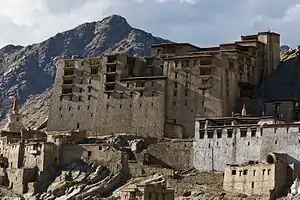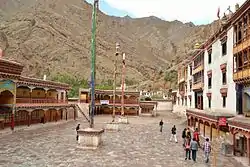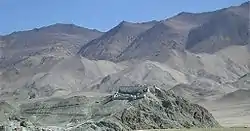Sengge Namgyal
Sengge Namgyal (Sen-ge-rnam-rgyal, c. 1570–1642) was a 17th-century Namgyal dynasty King of Ladakh, India from 1616 to his death in 1642. A Buddhist, he was noted for his immense work in building monasteries, palaces and shrines in Ladakh and is known as the "Lion King".

Biography

Sengge was born to Jamyang Namgyal and a Muslim mother. He was a devout Buddhist.[1][2]
In his youth, he showed great martial skill and a flair for command. Talents which got him the command of the army. In 1614, he captured the mining town of Rudok followed by Spurangs, another important gold mining town, in 1615. The plunder and the output from these towns financed the building projects he would later commission as the King. In 1616, on the death of his father, Jamyang Namgyal, he ascended to the throne. He completed the conquests of Kingdom of Ngaris after a brief siege of Guge castle in 1619.[3]

References
- Kaul, H. N. (1998). Rediscovery of Ladakh. ISBN 9788173870866.
- Singh Jina, Prem (1996). Ladakh: the land and the people. Indus Publishing. p. 77. ISBN 81-7387-057-8.
- "Chemrey Gompa". Buddhist-temples.com. Retrieved 9 October 2009.